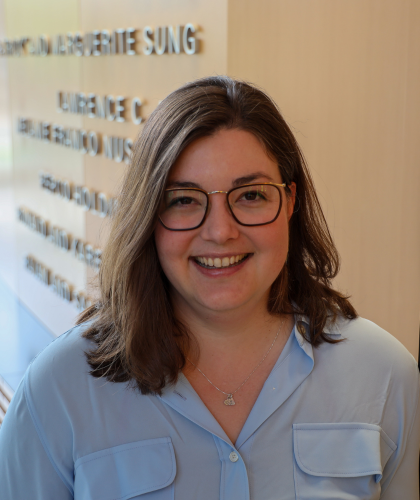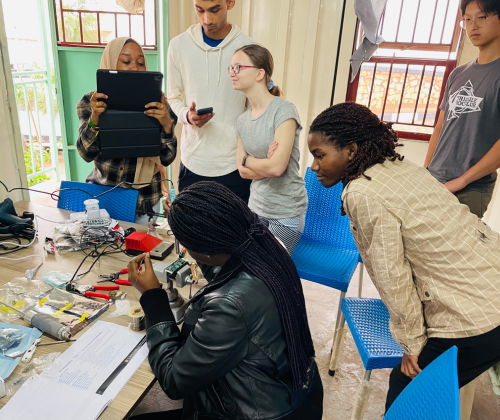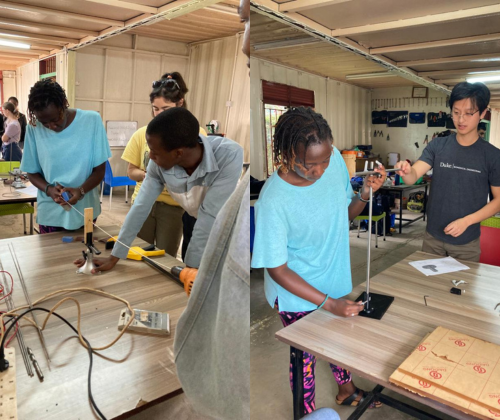Jenna Mueller Receives NSF CAREER Award
On April 23, University of Maryland Assistant Professor Jenna Mueller received the U.S. National Science Foundation (NSF) Faculty Early Career Development Program (CAREER) award for her project, "Studying biophysical properties of the cervix to engineer models of cervical dysplasia." The award will provide Mueller with $626K of research funding over the next five years. The NSF CAREER award supports early-career faculty who have demonstrated potential as academic role models and research leaders in their field. Highly competitive, the award is considered one of the most distinguished honors given to early career faculty. “I’m so thrilled to receive the NSF CAREER award and to get to work on our project,” says Mueller. “This is a huge honor—one that doesn’t belong to just me but also to the many people who helped me along the way, including my students who generated the preliminary data, and colleagues, collaborators, and members of the proposal development office who provided helpful feedback as I developed the ideas behind the proposal.”
Much of Mueller’s work in women’s health has focused on cervical cancer prevention, which has particularly drawn her toward better understanding cervical dysplasia, the precursor to cervical cancer. “As I’ve worked in this space over the past decade, it’s become increasingly clear that there are very few animal models of cervical dysplasia. This means that we have limited knowledge of how tissue properties change during the development and progression of cervical dysplasia, which can impact the transport of drugs,” Mueller explains.
“Our results will guide the development of a computational model of drug transport through abnormal cervical tissue,” she says. “In the long term, the model can support the development of therapeutic interventions for cervical dysplasia, like the ethanol gel we’ve been developing in my lab.”
“Through the educational initiative, our students will work with Ugandan students to develop biomedical technologies to improve cancer management for all communities,” explains Mueller. “We will teach students about human-centered, accessible design practices—which they will then have an opportunity to implement.”
Mueller is the first BIOE faculty member to win the award in 2024, but joins several current members of the department as NSF CAREER Award winners, including Erika Moore (2023), Katharina Maisel (2021), Gregg Duncan (2021), Giuliano Scarcelli (2020), Steven Jay (2018), Silivina Matysiak (2015), Chis Jewell (2014), Ian White (2012), and Helim Aranda-Espinoza (2007).
Related Articles: May 6, 2024 Prev Next |



 Mueller joined the UMD Fischell Department of Bioengineering in August 2020 and leads the
Mueller joined the UMD Fischell Department of Bioengineering in August 2020 and leads the  The support of the NSF CAREER award will enable Mueller and her research team to understand how the tissue properties of the cervix change during the development of cervical dysplasia. With an increased understanding of how tissue properties change, better drug delivery and treatment methods can be developed for patients.
The support of the NSF CAREER award will enable Mueller and her research team to understand how the tissue properties of the cervix change during the development of cervical dysplasia. With an increased understanding of how tissue properties change, better drug delivery and treatment methods can be developed for patients. Also supported by the NSF CAREER award, the research will be directly integrated with a global educational initiative that enables UMD students to work on projects with students at
Also supported by the NSF CAREER award, the research will be directly integrated with a global educational initiative that enables UMD students to work on projects with students at  This impactful work of teaching human-centered, accessible design—which Mueller includes in her Engineering Design for Global Health class—recently
This impactful work of teaching human-centered, accessible design—which Mueller includes in her Engineering Design for Global Health class—recently